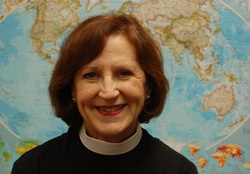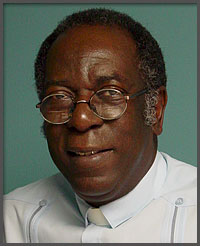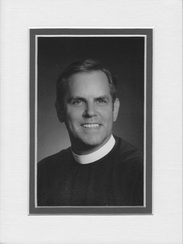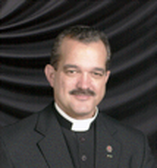
Jeremiah 34-35, Psalm 58, James 1
Kathleen Gannon
The quotes below, which place me in
this book, are thanks to Sophie Laws who authored the Introduction to James in
my Harper Collins Study Bible.
As we wake to the news this morning, we find that the horrific events of Monday,
September 16th are not a dream, but are another nightmare for our country.
Another troubled young man, with guns, took his anger out in a shooting rampage
in Washington, DC. It is too soon to even guess at his ‘motives’ or to discover
the likely disconnect in his brain that would allow him to take the lives of
others. It is too soon to know even the names of each of the 12 victims.
Just when I think –Lord, what is going on in this world? I am struck by the power of the words and images we are encountering in our Bible Challenge readings. I scan the readings to come and
find a gem, a verse that reverberates, a story that reminds me of why we are
reading this scripture in the first place. I scan ahead and find: James 1:19
You must understand this my
beloved, let everyone be quick to listen, slow to speak, slow to anger, for your
anger does not produce God’s righteousness. Therefore rid yourselves of all
sordidness and rank growth of wickedness, and welcome with meekness the
implanted Word that has the power to save your
souls.”
It is too bad, I think, that my anger does not produce God’s righteousness – because the news today makes me angry enough to send God’s righteousness clear across this world and back. But
that is not my job as a Christian leader, it is God’s.
I always think of James as a leadership book… We enter into James, which opens as if it is a letter, from “James, a servant of God and the Lord, Jesus Christ…” This James “traditionally has been
identified as James, the brother of Jesus (Gal 1.19) and who became the leader
of the church in Jerusalem (Acts 15:13; 21:18) and who was martyred during the
years before the outbreak of the Jewish War of 66-70 C.E.” This James is a
leader, a leader who has seen the miracles first hand, heard the teachings, a
leader who has built a church, a leader who risked and lost his life, a leader
whose words are of “prayer” and “morality” and a loyalty to the teachings of
Jesus.
I welcome the implanted Word, with the meekness of today… Knowing that my anger won’t help, I turn to prayer.
Lord, what is going on in this world?
Gracious God, we pray for all of the
victims of the Navy Shipyard shooting in Washington, DC.
We pray:
· For those whose lives were lost to us and are now surely in your eternal realm.
· For those wounded, that they may be healed.
· For those who witnessed the shooting, and fled for their lives, that they may be
comforted.
· For the first responders and their care for the many
victims.
We pray for comfort, for strength and for your Word, implanted in each of us, to again, save all of us.
 The Bible Challenge, Day 253: Jeremiah 31-33, Psalm 57 and Hebrews 13
God called the prophet Jeremiah in a stressful time. God’s chosen people are about to be defeated by their aggressive neighbor from Babylon and taken away from their homeland, the Promised Land. Jeremiah explains the complex truth of God’s anger and God’s faithfulness as the Babylonian army stands poised to take and destroy the Holy City, Jerusalem. In this portion of the Book of the Prophet Jeremiah we hear God’s words of judgment: the Lord is angry because of the people’s unfaithfulness, demonstrated by the altars to pagan gods on the roofs of houses within the city walls, by the idols to false gods placed brazenly inside God’s temple in the heart of the city, and by the shrines to the regionally popular pagan god Baal in a neighboring valley. At these shrines God’s people have practiced the abomination of child sacrifice, which God clearly rejected for his people when God’s angel grabbed Abraham’s hand to prevent him from slaying his son Isaac and instead provided a ram for the holy sacrifice. God is sick to death over these abominations from the beloved descendants of Abraham. God’s heart is broken because the people have turned their backs on the God who persists in loving them in spite of themselves.
Severe punishment is coming – deserved punishment – yet God wants to reassure Israel with a promise that they have a future together. In the beloved passage of Jeremiah 31:31-34, included among the options for Advent Lessons and Carols and for the Easter Vigil, God promises to enter a new covenant with the people, one written on their hearts. The old codebook of Torah will no longer act as a kind of checklist of duties that govern the life of the faithful. In this new covenant the people will be responding to God through their internalized understanding of God’s faithful loving-kindness and guidance. In dramatic language the Lord proclaims, “I would no sooner break my covenant with day and night or the laws of heaven and earth than I would reject the descendants of Jacob and my servant David…I will restore the captives and have compassion on them.” (Jeremiah 33:25-26, Common English Bible)
Psalm 57 is a perfect complement to the situation in today’s portion of Jeremiah. Here the psalmist declares confidence in God’s strength and faithful love in the midst of danger. In the closing portion of the Letter to the Hebrews (chapter 13), the author wants to encourage the early church as it seeks to meet the challenges of its own time. “Jesus Christ is the same yesterday, today and forever!” declares the author of Hebrews. And so is the world. As the world turns, human beings continue to act selfishly and make destructive choices. But our life in Christ can reorient us towards a new way of living – one focused on the welfare of others. Seeing the world with God’s eyes, we seek to love others, practice hospitality to strangers, and remember the vulnerable. This new orientation is established at our baptism and grows stronger as we walk the talk of our faith, learning from our spiritual forbears and showing forth our faith not only with our lips but also in our lives. All around us people are searching for a spiritual dimension in their lives. “I’m spiritual but not religious” is a popular description of this search. To me this is clear evidence that God is still reaching out to us in our hearts. Our opportunity is to share the hope within us by telling our stories of God’s faithful loving-kindness today.
Jennie Lou Reid
 Jeremiah 28-30
Psalm 56
Hebrews 12
“For my house shall be called a house of prayer for all nations (Psalms 56:7).
This famous verse shows how God has always made it possible for all to find grace by submission to his rules of justice and compassion. This assurance of restoration of Jerusalem, although full of promises of liberation from all enemies, is rooted in the return of the people to God’s ways.
“So you shall be my people and I will be your God” (Jeremiah 30:22).
In order for a people to enjoy God’s grace and love, they have to turn to God, to respond to God’s constant invitation to come home. The title given to chapters 11, 12, and 13 of the Letter to the Hebrews is “a call to faith.” (New English Bible)
Indeed, to return to God, to come home, is not an order from an autocratic judge, but an invitation from a father, a mother to discover and enjoy the pleasure of walking with God. God’s commands are for our own good, for helping us to truly fulfill our vocation to be humans created in God’s image. No one should be worldly minded like Esau who sold his birthright for a meal (Hebrews 12:17). To be worldly minded is to put one’s trust in the apparent certainties of the world instead of cultivating the faith that would allow us to see even in sufferings, the hand of God pulling us on the straight path the way parents discipline their children because they love them.
The Venerable J. Fritz Bazin, D. Min.
Archdeacon for Immigration and Social Justice Ministries
Diocese of Southeast Florida
 September 13, 2013 or Day 250
Jeremiah 25-27; Psalm 55; Hebrews 11
Now faith is the assurance of things hoped for, the conviction of things not seen (Hebrews 11.1).
Anyone who wears glasses or contacts has experienced that moment when we first put on the new glasses and look out the window. Familiar objects suddenly appear in vivid focus. You are able to distinguish details -- distant leaves on a tree, the words on a previously unnoticed sign. For a brief moment the world around you looks new and gloriously distinct. Once we become habituated to our new glasses, however, that extraordinary moment of clarity fades.
I thought about this when I read the author of Hebrews definition of faith as "the assurance of things hoped for, the conviction of things not seen" (Hebrews 11;1). Faith -- a believing trust in God's presence and promises--is like donning a pair of glasses that enables us to see with conviction things the world does take notice of or see. I believe all people of faith have experienced such moments, life-giving times when God is so palpably real, so abundantly present that our hearts swell with love. But such moments can be fleeting. Life with all its pain and challenges slaps us with an arctic wind and these divine moments fade.
The challenge of a life of faithful discipleship is to keep believing in these radiant vistas, keep trusting in God's promise to make all things new, when the arctic winds blow and the world tells us this is the cold, hard truth. In such times, we need the examples of others who have faced such challenges and yet kept seeing the promised land of grace. In chapter 11 , the author of Hebrews unfurls a list of some of God's faithful ones whose lives were shaped by their faithful insight that the world is created, sustained and redeemed by God even if, as the author writes, "all of these died in faith without having received the promises, but from a distance they saw and greeted them" (Hebrews 11.13).
This chapter inspires us to keep listening, keep looking and keep believing that in our pilgrimage of faith God's promised land of grace is near at hand.
Andrew Sherman+
 Hebrews 10
Some people dread going to annual board meetings. Either the meetings are dominated by one single person, or there is a tremendous division among the board with personality conflicts among members causing people to come away disappointed. But that is not the case with our annual People Reaching People Inc. board meetings. I just came back from our annual meeting and was thoroughly encouraged. A matter of fact, some of our long standing members said they look forward to our time together, because it is a time of edification and encouragement for them. Other newer members who were attending for the first time said they were hesitant about coming but once they came, they saw how important it was to be part of this annual event.
This reminds me of our reading today in Hebrews 10:24-25 when the author challenges Christians to encourage one another to spur one another on towards love and good deeds (24) and to continue to encourage one another as we meet together (25). These are key ingredients for good Christian fellowship.
I think these where integrated in our annual meeting. It was made clear from the beginning that our aim was to glorying God in our worship, starting with Holy Communion each morning, and sharing Christlike moments in the evenings. Secondly, everyone was a key player and contributor towards the People Reaching People board meeting in doing good deeds. Thirdly, the emphasis on building relationships and allowing board members to tell their life stories demonstrated Christian love. Finally, encouraging one another was pivotal to success. As a result, all of us came away sensing the Holy Spirit had intervened and done a great work, not only for the PRP board but in our individual lives as well.
The next time you participate in a time of fellowship or parish meeting, I encourage you to remember Hebrews 10:24-15 and be intentional about spurring one another on towards love, good deeds while encouraging one another in faith.
 Day 248: Jeremiah 19-21, Psalm 53, Hebrews
If you ask the average city kid where his peas and carrots came from, he’ll probably reply, “The grocery store!” Despite the urban farming trend, our society is no longer agrarian. We don’t associate our salads and green bean casseroles with digging, watering and fertilizing as our ancestors did. But vegetables still grow in the ground, whether it occurs to us or not. (Hydroponics excepted, of course.)
Ritual sacrificial worship is as foreign to the contemporary reader as crop rotation to a city slicker. Yet the liturgical sacrifice system is exactly how the author of the epistle to the Hebrews explains the wonderful blessing secured for us through Christ Jesus.
Jesus willingly offered himself over to death at the cross. At first, his followers struggled to understand why things unfolded this way. But over time, things began to make sense. Chapter nine of Hebrews explains that Jesus’ death was a perfect sacrifice for the sin of the whole world. No longer must we depend on an earthly High Priest to offer the blood of animals to expiate sin; Jesus’ blood secured forgiveness once for all for our guilt incurred under the law.
But there’s more. Jesus’ death and resurrection initiated a new covenant, one God alluded to way back in the time of Jeremiah. Scripture bears witness that God’s people were scattered for their unfaithfulness. But in Jesus, God himself suffered so we might all be gathered together, both Jew and Gentile, and made one in him.
Ritual sacrifice isn’t a point of reference for us as it was for the Hebrew people of Jesus’ day. Yet it is an important part of our salvation history. I invite you to rejoice with me in all that Jesus’ sacrifice means for us today – and for all eternity, too. -Susan Beebe
 Daily Blog – Day 247, Jeremiah 16-18, Psalm 52, Hebrews 8
Blessed is the man who trusts in the Lord,
whose trust is the Lord.
He is like a tree planted by water,
that sends out its roots by the stream,
and does not fear when heat comes, for its leaves remain green,
and is not anxious in the year of drought,
for it does not cease to bear fruit. (Jeremiah 17:7-8)
With our chapters from the Old Testament prophet, we find that Jeremiah chastises the people of Israel for their unfaithfulness, and for fabricating and worshipping false gods. Those who trust God are praised and portrayed as trees planted by water, sending their roots to reach and take in the water. They flourish because they have trusted God and have depended upon his grace. Jeremiah also utilizes that memorable image of the potter and the clay. God can only do so much with imperfect clay and shape it as it seems best. As imperfect clay we must again trust and allow God to form and shape us into righteousness. Even Psalm 52 describes the righteous person as one being like an olive tree flourishing in the house of the Lord. Another powerful image is presented as we realize that olive trees can survive for centuries, and those who root themselves in God’s teachings are building on a sure and solid foundation.
The author of Hebrews further explores our relationship with God and even quotes Jeremiah. For this writer it is all about covenant, but even much more our understanding of covenant where we perceive it as a contractual relationship between two equals, like marriage or a business relationship. In this context, the covenant of faith is superior and contains two additional and unique characteristics. One is that it is initiated by God. Just as the tree was planted by God or the clay was made by God, so it is God who approaches us first. And second, this is not a relationship of equals. God brings much more to the table than we could ever. There is a depth of commitment and an abundance of grace brought by God that we could never produce. God is simply asking us to be faithful, and in doing so will bless us beyond imagination.
The Very Rev. Dr. William L. Stomski,
Chaplain and Sacred Studies Educator, Saint Joseph’s Episcopal School, Boynton Beach
Dean of the Diocesan School for Christian Studies
 The Bible Challenge
Jeremiah 13-15 Psalm 51 Hebrews 7
Do you remember the days of your childhood when mom and/or dad did not spare the rod? My reflection of the assigned reading from Jeremiah today brings back vivid memories of my developmental years. The generation in which I grew up, and those preceding it, accepted corporal punishment as an appropriate method of raising children. This punishment was expressed most often through verbal and physical abuse, or the threat thereof. This was my dad’s school for child development application.
I remember times when my behavior was less than stellar. In reaction, my dad would instantly go ballistic and instinctively reach his right hand to the buckle of his belt. Once this punitive behavior was put into motion my response was terror. I began to cry and say how sorry I was and asked for forgiveness, promising to never repeat my behavior again. My goal was to somehow reach the sensitive spot in his heart before the pant loops unleashed his belt. At all costs I had to reverse my father’s anger so to prevent feeling the sting of leather against my skin.
Those to whom Jeremiah is writing appear to be close to receiving a severe punishment from God. God is not happy with their backsliding and self-seeking behaviors. However, like a loving parent, God is seeking their heart and their commitment to Right behavior. Oh, how weak were the Jews of old? Oh, how weak are we?
The very Good News is God loves us so very, very much! God calls us to repentance… a mental and spiritual state of sorrowfulness… not for God’s sake but for ours… It is only in a state of repentance (Psalm 51) that we can forgive others and most importantly ourselves. This grace is only given to us through Jesus.
It is Jesus, the Incarnate God, our High Priest, who has made repentance possible (Hebrews 7). It is only when we surrender our heart, our will, our lives to his Healing love that we come to know the freedom of forgiveness. We are asked to surrender into this Love. Can you do that?
When I was successful in touching my dad’s angry heart, and his anger was abated, I felt my fears fade away… A new chance, a new life, was given to me. This is kind’a what forgiveness is like. Knowing that my loving father loves me and forgives me no matter how poorly I have behaved.
Enjoy the Love!
The Reverend Bernard J. Pecaro
St. Martin, Pompano Beach
 Saturday September 7th, 2013
I was confident to go ziplining at an adventure park in Mauritius but it had not been explained to me that I must first cross an extremely wobbly bridge over a long gorge with just one 8” slat attached to a cable. As I walked, the bridge wobbled unceasingly. We were harnessed in our ziplining gear and clipped on the cable overhead, but without sides to the bridge and only a small cable on each side, one had a full 360 view of the daunting gorge and below.
The challenge of the bridge was the extreme effort to put one foot in front of the other. In order to get to the other side (to zipline) we had to walk a very slow fifteen minutes, across this extremely wobbly plank they called a bridge. In order to calm my fears, I sang a little tune with the words, “I’m Free Indeed.” On the second half of the journey, when fear began to creep into my whole being, I almost changed the words to proclaim my real feelings, “I’m really, really scared,” But I didn’t think that would help the situation so I kept the original words, singing “I’m Free Indeed.”
One woman in our group of nine got stuck on the bridge, paralyzed by fear, unable to move any farther. The guide went back to help her and spoke directly to her. “Keep your eyes on me.” As she did, the guide gracefully led her across the bridge to the other side. This story reminds me of today’s reading in Hebrews 6:19. We take hold of the hope offered to us and are greatly encouraged. We have hope as an anchor for the soul, firm and secure.
We all have times in life when our faith waivers and it is tough to go on. It is then that we must take hold of the hope offered to us through Christ and draw from God’s encouragement. Just as the walker over the gorge’s chasm was attached to a cable, we too have a hope which is our anchor for our soul. That anchor holds us firm and secure, no matter what our situation. We just need to put one foot in front of the other and by faith, walk over the bridge confidently with Christ, who is our hope and anchor of our soul. As we walk, let us remember that as God’s children, we are free indeed!
Patsy McGregor
 Jeremiah 7-9; Psalm 49; Hebrews 5
Our Jewish brothers and sisters have begun the High Holy Days…the “Days of Awe,” starting with Rosh Hashanah, the New Year, and ending with Yom Kippur, the Day of Atonement. Historically, Yom Kippur was the day on which the high priest offered sacrifice for sin as we see in the first verse of Chapter 5 of the Letter to the Hebrews. This whole first section of Hebrews makes comparisons and contrasts between the Jewish high priesthood and that of Jesus. The necessity of being called by God, (which we see in the Old Testament and in Jesus) and the high priest’s identification with sinners, (and the sinlessness of Jesus) may well have been better understood by the early Christians than by us. But the metaphor holds true when we hear the verse from Psalm 110, “You are a priest forever, after the order of Melchizedek.”
In the same way that Melchizedek was called king of righteousness and king of Salem (which means “peace”), in the same way that he offers bread and wine and blessing (see Genesis 14), those attributes have been given to Christ through the centuries...He comes and offers us those gifts as well.
I’ve spent the last three days at the Duncan Center with clergy from throughout the Diocese who gathered for our annual conference. One of things I came away with is that all of us, the Body of Christ, are called to have those same attributes of righteousness, peace and blessing. All of us are called to share the bread and wine with one another, and share with Christ in his eternal priesthood.
TVR Doug McCaleb
Dean, Trinity Cathedral Miami
|










 RSS Feed
RSS Feed